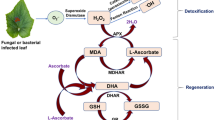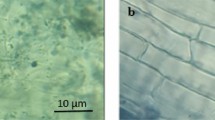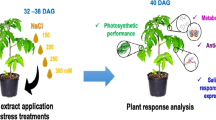Abstract
In this study, the toxic effects of monosodium glutamate (MSG), which is the sodium salt of glutamic acid and used as a flavor-enhancing additive in foods, and the protective role of cape gooseberry (Physalis peruviana L.) extract against these effects were investigated using Allium cepa L. test material with physiological, cytogenetic, and biochemical parameters. In the study, physiological changes were evaluated by determining root length, weight gain, and rooting percentage; genetic changes were evaluated by chromosomal abnormalities, micronucleus (MN) formation, mitotic index ratio (MI), and DNA damage. Oxidative stress was evaluated by determining the levels of malondialdehyde (MDA), glutathione (GSH), superoxide dismutase (SOD), and catalase (CAT). Further, the relationships between oxidative stress and other parameters in the study were investigated. The antimutagenic effect of P. peruviana L. extract was evaluated as inhibition caused by MSG-induced chromosomal abnormalities (CAs) and DNA damage. In the study, six groups, including one control and five applications, were formed. The bulbs of Allium cepa L. in the control group were treated with tap water; the bulbs in the administration groups treated with 1000 mg/L MSG, 125 mg/L, and 250 mg/L concentrations of P. peruviana L. extract and MSG (1000 mg/L) in combination with P. peruviana L. extracts (125 mg/L and 250 mg/L) for 72 h. At the end of the application, compared to the control group, MSG application caused decreases in rooting percentage, weight gain, root length and MI, increases in frequencies of MN formation, chromosomal abnormalities, and DNA damage. In the biochemical analysis, it was determined that there were increases in MDA, SOD, and CAT levels and a decrease in GSH level. P. peruviana L. extract ameliorated MSG toxicity by showing improvement in all these parameters depending on the application concentration. As a result, considering the toxic effects of MSG, it has been understood that the use as a food additive should be abandoned and the use of P. peruviana L. in addition to daily nutrition has been found to be a good antioxidant nutrient in reducing the effects of exposed toxic substances.







Similar content being viewed by others
Data availability
All data generated or analyzed during this study are included in this published article.
References
Abdel Moneim AE (2016) Prevention of carbon tetrachloride (CCl4)-induced toxicity in testes of rats treated with Physalis peruviana L. fruit. Toxicol Ind Health 32:1064–1073. https://doi.org/10.1177/0748233714545502
Abdel Moneim AE, Bauomy AA, Diab MM, Shata MTM, Al-Olayan EM, El-Khadragy MF (2014) The protective effect of Physalis peruviana L. against cadmium-induced neurotoxicity in rats. Biol Trace Elem Res 160:392–399. https://doi.org/10.1007/s12011-014-0066-9
Acar A, Çavuşoğlu K, Türkmen Z, Çavuşoğlu K, Yalçın E (2015) The investigation of genotoxic, physiological and anatomical effects of paraquat herbicide on Allium cepa L. Cytologia 80:343–351. https://doi.org/10.1508/cytologia.80.343
Acar A, Türkmen Z, Çavuşoğlu K, Yalçın E (2020) Investigation of benzyl benzoate toxicity with anatomical, physiological, cytogenetic and biochemical parameters in in vivo. Caryologia 73:21–32
Ahmed LA (2014) Renoprotective effect of Egyptian cape gooseberry fruit (Physalis peruviana L.) against acute renal injury in rats. Sci World J. https://doi.org/10.1155/2014/273870
Albrahim T, Binobead MA (2018) Roles of Moringa oleifera leaf extract in improving the impact of high dietary intake of monosodium glutamate-induced liver toxicity, oxidative stress, genotoxicity, DNA damage, and PCNA alterations in male rats. Oxidative Med Cell Longev 2018:1–11. https://doi.org/10.1155/2018/4501097
Al-Olayan EM, El-Khadragy MF, Aref AM, Othman MS, Kassab RB, Abdel Moneim AE (2014) The potential protective effect of Physalis peruviana L. against carbon tetrachloride-induced hepatotoxicity in rats is mediated by suppression of oxidative stress and downregulation of MMP-9 expression. Oxid Med Cell Longev. https://doi.org/10.1155/2014/381413
Araujo TR, Freitas IN, Vettorazzi JF, Batista TM, Santos-Silva JC, Bonfleur ML, Balbo SL, Boschero AC, Carneiro EM, Ribeiro RA (2017) Benefits of L-alanine or L-arginine supplementation against adiposity and glucose intolerance in monosodium glutamate-induced obesity. Eur J Nutr 56:2069–2080. https://doi.org/10.1007/s00394-016-1245-6
Arun M, Asha VV (2007) Preliminary studies on antihepatotoxic effect of Physalis peruviana Linn. (Solanaceae) against carbon tetrachloride induced acute liver injury in rats. J Ethnopharmacol 111:110–114. https://doi.org/10.1016/j.jep.2006.10.038
Ataseven N, Yüzbaşıoğlu D, Keskin AÇ, Ünal F (2016) Genotoxicity of monosodium glutamate. Food Chem Toxicol 91:8–18. https://doi.org/10.1016/j.fct.2016.02.021
Atik M, Karagüzel O, Ersoy S (2007) Effect of temperature on germination characteristics of Dalbergia sissoo seeds. Mediterr Agric Sci 20:203–210 (in Turkish)
Bahmani K, Noori SAS, Darbandi AI, Akbari A (2015) Molecular mechanisms of plant salinity tolerance: a review. Aust J Crop Sci 9:321–336
Beauchamp C, Fridovich I (1971) Superoxide dismutase: improved assays and an assay applicable to acrylamide gels. Anal Biochem 44:276–287. https://doi.org/10.1016/0003-2697(71)90370-8
Beers RF, Sizer IW (1952) Colorimetric method for estimation of catalase. J Biol Chem 195:133–139
Bound DJ, Murthy PS, Negi PS, Srinivas P (2020) Evaluation of anti-quorum sensing and antimutagenic activity of 2, 3-unsaturated and 2, 3-dideoxyglucosides of terpene phenols and alcohols. LWT 122:108987. https://doi.org/10.1016/j.lwt.2019.108987
Çakir Ö, Pekmez M, Çepni E, Candar B, Fidan K (2014) Evaluation of biological activities of Physalis peruviana ethanol extracts and expression of Bcl-2 genes in HeLa cells. Food Sci Technol 34:422–430. https://doi.org/10.1590/fst.2014.0060
Chemicals C (2020) Monosodium glutamate. https://cameochemicalsnoaagov/chemical/20715 Accessed (03 January 2020)
Castro J, Ocampo Y, Franco L (2015) Cape gooseberry [Physalis peruviana L.] calyces ameliorate TNBS acid-induced colitis in rats. J Crohns Colitis 9:1004–1015. https://doi.org/10.1093/ecco-jcc/jjv132
Chakraborty R, Mukherjee AK, Mukherjee A (2009) Evaluation of genotoxicity of coal fly ash in Allium cepa root cells by combining comet assay with the Allium test. Environ Monit Assess 153:351–357. https://doi.org/10.1007/s10661-008-0361-z
Dewi L, Sulchan M (2018) Potency of cape gooseberry (Physalis Peruviana) juice in improving antioxidant and adiponectin level of high fat diet streptozotocin rat model. Rom J Diabetes Nutr Metab Dis 25:253–260. https://doi.org/10.2478/rjdnmd-2018-0029
Di Sotto A, Evandri MG, Mazzanti G (2008) Antimutagenic and mutagenic activities of some terpenes in the bacterial reverse mutation assay. Mutat Res 653:130–133. https://doi.org/10.1016/j.mrgentox.2008.04.004
Dixit SG, Rani P, Anand A, Khatri K, Chauhan R, Bharihoke V (2014) To study the effect of monosodium glutamate on histomorphometry of cortex of kidney in adult albino rats. Ren Fail 36:266–270. https://doi.org/10.3109/0886022X.2013.846865
Duran N, Aki C (2017) Effects of umami substances monosodium glutamate (MSG) and ribonucleotides (GMP/IMP) on mitotic index in Allium cepa L. plant. Ann Biol Res 8:18–23
El-Beltagi HS, Mohamed HI, Safwat G, Gamal M, Megahed BM (2019) Chemical composition and biological activity of Physalis peruviana L. Gesunde Pflanzen 71:113–122 (in German). https://doi.org/10.1007/s10343-019-00456-8
El-Meghawry AE, Elshama SS, Osman HEH (2015) Effects of Physalis peruviana L on toxicity and lung cancer induction by nicotine derived nitrosamine ketone in rats. Asian Pac J Cancer Prev 16:5863–5868. https://doi.org/10.7314/APJCP.2015.16.14.5863
Erman F, Kaya T, Yilmaz O, Erman O, Ozsahin AD (2017) Influences of Physalis peruviana L. and Lupinus albus L. extracts on the levels of some biochemical parameters in erythrocytes and serum of streptozotocin induced diabetic rats. Fresenius Environ Bull 26:4876–4882
Farombi EO, Onyema OO (2006) Monosodium glutamate-induced oxidative damage and genotoxicity in the rat: modulatory role of vitamin C, vitamin E and quercetin. Hum Exp Toxicol 25:251–259. https://doi.org/10.1191/0960327106ht621oa
Fenech M, Chang WP, Kirsch-Volders M, Holland N, Bonassi S, Zeiger E (2003) HUMN project: detailed description of the scoring criteria for the cytokinesis-block micronucleus assay using isolated human lymphocyte cultures. Mutat Res 534:65–75. https://doi.org/10.1016/S1383-5718(02)00249-8
Fernandes TC, Mazzeo DEC, Marin-Morales MA (2007) Mechanism of micronuclei formation in polyploidizated cells of Allium cepa exposed to trifluralin herbicide. Pestic Biochem Physiol 88:252–259. https://doi.org/10.1016/j.pestbp.2006.12.003
Fiskesjö G (1985) The Allium-test as a standard in environmental monitoring. Hereditas 102:99–112. https://doi.org/10.1111/j.1601-5223.1985.tb00471.x
Fries AM, Tapia ME (2007) Andean crops field guide. Millenium Digital, Peru ((in Spanish)
FSANZ (Food Standards Australia New Zealand) (2003) Monosodium glutamate, a safety assessment, Technical Report Series No 20 https://wwwfoodstandardsgovau/publications/documents/MSG%20Technical%20Reportpdf Accessed 03 March 2019
Geha RS, Beiser A, Ren C, Patterson R, Greenberger PA, Grammer LC, Ditto AM, Harris KE, Shaughnessy MA, Yarnold PR, Corren J, Saxon A (2000) Review of alleged reaction to monosodium glutamate and outcome of a multicenter double-blind placebo-controlled study. J Nutr 130:1058S–1062S. https://doi.org/10.1093/jn/130.4.1058S
Grant WF (1982) Chromosome aberration assays in Allium: a report of the US Environmental Protection Agency gene-tox program. Mutat Res 99(3):273–291. https://doi.org/10.1016/0165-1110(82)90046-X
Hamza RZ, Al-Baqami NM (2019) Testicular protective effects of ellagic acid on monosodium glutamate-induced testicular structural alterations in male rats. Ultrastruct Pathol 43:170–183. https://doi.org/10.1080/01913123.2019.1671569
Hamza RZ, Al-Salmi FA, Laban H, El-Shenawy NS (2020) Ameliorative role of green tea and zinc oxide nanoparticles complex against monosodium glutamate-induced testicular toxicity in male rats. Curr Pharm Biotechno 21:488–501. https://doi.org/10.2174/1389201020666191203095036
Hanada H (2011) Dl-α-tocopherol enhances the herbicide 1,1′-dimetyl-4,4′-bipyridium dichloride (paraquat, PQ) genotoxicity in cultured anuran leukocytes. Hereditas 148:118–124. https://doi.org/10.1111/j.1601-5223.2011.02226.x
Harte J, Holdren C, Schneider R, Shirley C (1991) Toxics a to z: a guide to everyday pollution hazards. University of Califonia Press, California, pp 47–104
Khatab HA, Elhaddad NS (2015) Evaluation of mutagenic effects of monosodium glutamate using Allium cepa and antimutagenic action of Origanum majorana L. and Ruta chalepensis medical plants. Biotechnol J Int 8:1–11. https://doi.org/10.9734/BBJ/2015/17695
Kılıç ZS, Aydın S, Bucurgat ÜÜ, Başaran N (2018) In vitro genotoxicity assessment of dinitroaniline herbicides pendimethalin and trifluralin. Food Chem Toxicol 113:90–98. https://doi.org/10.1016/j.fct.2018.01.034
Końca K, Lankoff A, Banasik A, Lisowska H, Kuszewski T, Góźdź S, Koza Z, Wojcik A (2003) A cross-platform public domain PC image-analysis program for the comet assay. Mutat Res 534:15–20. https://doi.org/10.1016/s1383-5718(02)00251-6
Kumar C, Ghosh AK (2019) Fabrication of a vermifiltration unit for wastewater recycling and performance of vermifiltered water (vermiaqua) on onion (Allium cepa). Int J Recycl Org Waste Agric 8:405–415. https://doi.org/10.1007/s40093-019-0247-9
Lau A, Tymianski M (2010) Glutamate receptors, neurotoxicity and neurodegeneration. Pflugers Arch 460:525–542. https://doi.org/10.1007/s00424-010-0809-1
Lee SW, Pan MH, Chen CM, Chen ZT (2008) Withangulatin I, a new cytotoxic withanolide from Physalis angulata. Chem Pharm Bull 56:234–236. https://doi.org/10.1248/cpb.56.234
Liu R, Zhou Q, Zhang L, Guo H (2007) Toxic effects of wastewater from various phases of monosodium glutamate production on seed germination and root elongation of crops. Front Environ Sci Eng China 1:114–119. https://doi.org/10.1007/s11783-007-0021-5
Lokesh BS, Kumar D, Handa M (2019) History of flavors associated with functional foods and nutraceuticals. In: Selvamuthukumaran M, Pathak YV (eds) Flavor development for functional foods and nutraceuticals. CRC Press, Florida, pp 1–21
Mondal M, Sarkar K, Nath PP, Paul G (2018) Monosodium glutamate suppresses the female reproductive function by impairing the functions of ovary and uterus in rat. Environ Toxicol 33:198–208. https://doi.org/10.1002/tox.22508
Moron MS, Depierre JW, Mannervik B (1979) Levels of glutathione, glutathione reductase and glutathione S-transferase activities in rat lung and liver. Biochim Biophys Acta 582:67–78. https://doi.org/10.1016/0304-4165(79)90289-7
Nagat SE, Hoda AK (2015) DNA content alterations in Allium cepa root tip nuclei after exposure to food preservative mono sodium glutamate (MSG) and antimutagenic activity of Origanium majorana L. and Ruta chalepensis medical plants. J Microbiol Biotechnol Res 5:38–45
Nan P, Yan SG, Wang YX, Du QY, Chang ZJ (2016) Oxidative stress, genotoxicity and cytotoxicity of 1-methyl-3-octylimidazolium chloride on Paramisgurnus dabryanus. Environ Toxicol Phar 47:1–5. https://doi.org/10.1016/j.etap.2016.06.018
Nocetti D, Sacristán C, Ruiz P, Guerrero J, Jorquera G, Uribe E, Bucarfey JL, Espinosa A, Puente L (2020) Physalis peruviana L. pulp prevents liver inflammation and insulin resistance in skeletal muscles of diet-induced obese mice. Nutrients 12:700–710. https://doi.org/10.3390/nu12030700
Ogata M, Hoshi M, Urano S, Endo T (2000) Antioxidant activity of eugenol and related monomeric and dimeric compounds. Chem Pharm Bull 48:1467–1469. https://doi.org/10.1248/cpb.48.1467
Onyema OO, Farombi EO, Emerole GO, Ukoha AI, Onyeze GO (2006) Effect of vitamin E on monosodium glutamate induced hepatotoxicity and oxidative stress in rats. Indian J Biochem Bio 43:20–24
Othman MS, Nada A, Zaki HS, Abdel Moneim AE (2014) Effect of Physalis peruviana L. on cadmium-induced testicular toxicity in rats. Biol Trace Elem Res 159:278–287. https://doi.org/10.1007/s12011-014-9955-1
Park HA, Kwon OK, Ryu HW, Min JH, Park MW, Park MH, Paik H, Choi S, Paryanto I, Yuniato P, Oh SR, Ahn KS, Lee JW (2019) Physalis peruviana L. inhibits ovalbumin-induced airway inflammation by attenuating the activation of NF-κB and inflammatory molecules. Int J Mol Med 43:1830–1838. https://doi.org/10.3892/ijmm.2019.4110
Partridge D, Lloyd KA, Rhodes JM, Walker AW, Johnstone AM, Campbell BJ (2019) Food additives: assessing the impact of exposure to permitted emulsifiers on bowel and metabolic health–introducing the FADiets study. Nutr Bull 44:329–349. https://doi.org/10.1111/nbu.12408
Praveen A, Gupta M (2018) Nitric oxide confronts arsenic stimulated oxidative stress and root architecture through distinct gene expression of auxin transporters, nutrient related genes and modulates biochemical responses in Oryza sativa L. Environ Pollut 240:950–962. https://doi.org/10.1016/j.envpol.2018.04.096
PubChem (2019) Monosodium glutamate. https://pubchem.ncbi.nlm.nih.gov/compound/23672308#section=InformationSources.
Ramadan MM, El-Ghorab AH, Ghanem KZ (2015) Volatile compounds, antioxidants, and anticancer activities of Cape gooseberry fruit (Physalis peruviana L.): an in-vitro study. J Arab Soc Med Res 10:56–64. https://doi.org/10.4103/1687-4293.175556
Rosculete CA, Bonciu E, Rosculete E, Olaru LA (2019) Determination of the environmental pollution potential of some herbicides by the assessment of cytotoxic and genotoxic effects on Allium cepa. Int J Environ Res Public Health 16:75–84. https://doi.org/10.3390/ijerph16010075
Sabeen M, Mahmood Q, Bhatti ZA, Irshad M, Bilal M, Hayat MT, Irshad U, Akbar TA, Arslan M, Shahid N (2020) Allium cepa assay based comparative study of selected vegetables and the chromosomal aberrations due to heavy metal accumulation. Saudi J Biol Sci 27:1368–1374. https://doi.org/10.1016/j.sjbs.2019.12.011
Sarac I, Bonciu E, Butnariu M, Petrescu I, Madosa E (2019) Evaluation of the cytotoxic and genotoxic potential of some heavy metals by use of Allium test. Caryologia 72:37-43. https://doi.org/10.13128/cayologia-256
Schwartz JR (2004) In bad taste, the MSG “syndrome” MSG. The 5th Annual Conference of the Weston A. Price Foundation
Sedlak J, Lindsay RH (1968) Estimation of total, protein-bound, and nonprotein sulfhydryl groups in tissue with Ellman’s reagent. Anal Biochem 25:192–205. https://doi.org/10.1016/0003-2697(68)90092-4
Shah N, Nariya A, Pathan A, Desai P, Shah J, Patel A, Chettiar SS, Jhala D (2019) Monosodium glutamate induced impairment in antioxidant defense system and genotoxicity in human neuronal cell line IMR-32. Eurasia J Biosci 13:1121–1128
Singh S, Rekha PD, Arun AB, Young CC (2009) Impacts of monosodium glutamate industrial wastewater on plant growth and soil characteristics. Ecol Eng 35:1559–1563. https://doi.org/10.1016/j.ecoleng.2009.06.002
Speit G, Hartmann A (2005) The comet assay. In: Keohavong P, Grant SG (eds) Molecular toxicology protocols. Humana Press, New Jersey, pp 85–95. https://doi.org/10.1385/1-59259-840-4:085
Spellman FR, Price-Bayer J (2019) Regulating food additives: the good, the bad, and the ugly. Bernan Press, New York, pp 7–8
Staykova TA, Ivanova EN, Velcheva IG (2005) Cytogenetic effect of heavy metal and cyanide in contamined waters from the region of Southwest Bulgaria. J Mol Cell Biol 4:41–46
Terevinto A, Cabrera MC, Saadoun A (2015) Catalase, SOD and GPx activities in triceps brachii muscle from Aberdeen Angus steers finished on pasture, pasture and concentrate, or concentrate. Am J Food Nutr 3:118-124. https://doi.org/10.12691/ajfn-3-5-2
Tseng YT, Lin KC (2015) Effects of volatile organic compound ether on cell responses and gene expressions in Arabidopsis. Bot Stud 57:1–9 https://www.doi.org/10.1186%2Fs40529-015-0112-8
Türkoğlu Ş (2015) Evaluation of genotoxic effects of five flavour enhancers (glutamates) on the root meristem cells of Allium cepa. Toxicol Ind Health 31:792–801. https://doi.org/10.1177/0748233713475509
Ünyayar S, Celik A, Çekiç FÖ, Gözel A (2006) Cadmium-induced genotoxicity, cytotoxicity and lipid peroxidation in Allium sativum and Vicia faba. Mutagenesis 21:77–81. https://doi.org/10.1093/mutage/gel001
Verma S, Srivastava A (2018) Morphotoxicity and cytogenotoxicity of pendimethalin in the test plant Allium cepa L. -a biomarker based study. Chemosphere 206:248–254. https://doi.org/10.1016/j.chemosphere.2018.04.177
Wahdan OA, Aly Badr S, Abdelfattah MS (2019) Phytochemical analysis, antibacterial and anticancer activities of the Physalis Peruviana calyces growing in Egypt. Food Nutr J:10.29011/2575–107091.100097
Walker R, Lupien JR (2000) The safety evaluation of monosodium glutamate. J Nutr 130:1049–1052. https://doi.org/10.1093/jn/130.4.1049S
Whitney EN, Rolfes SR (2018) Understanding nutrition. Cengage, Stamford, pp 631–632
Wijeyaratne WM, Wadasinghe LGYJG (2019) Allium cepa bio assay to assess the water and sediment cytogenotoxicity in a tropical stream subjected to multiple point and nonpoint source pollutants. J Toxicol 2019:1–10. https://doi.org/10.1155/2019/5420124
Yadav A, Raj A, Purchase D, Ferreira LFR, Saratale GD, Bharagava RN (2019) Phytotoxicity, cytotoxicity and genotoxicity evaluation of organic and inorganic pollutants rich tannery wastewater from a Common Effluent Treatment Plant (CETP) in Unnao district, India using Vigna radiata and Allium cepa. Chemosphere 224:324–332. https://doi.org/10.1016/j.chemosphere.2019.02.124
Yalçın E, Azap E, Çavuşoğlu K (2017) Investigation the antimutagenic effects of Smilax excelsa L. extracts by ames/salmonella/microsome test system. Duzce Uni J Sci Tech 5:622–631 (in Turkish)
Zedan A, Galal O, Al-Anany F (2017) Potential effect of some natural food additives against monosodium glutamate-induced genotoxicity in Vicia faba. Egypt J Genet Cytol 46:371-388. https://doi.org/10.21608/ejgc.2018.9210
Acknowledgments
Thanks to Giresun University Scientific Research Projects Department for supporting this study (FEN-BAP-A-150219-67).
Funding
This study was partially supported by Giresun University Scientific Research Projects Department (FEN-BAP-A-150219-67).
Author information
Authors and Affiliations
Contributions
AA carried out the experimental design, all experimental procedures, statistical analysis, and preparation of the article. The author read and approved the final manuscript.
Corresponding author
Ethics declarations
Ethics approval and consent to participate
Not applicable
Consent for publication
Not applicable
Conflict of interest
The author declares that he has no conflict of interest.
Additional information
Responsible Editor: Mohamed M. Abdel-Daim
Publisher’s note
Springer Nature remains neutral with regard to jurisdictional claims in published maps and institutional affiliations.
Rights and permissions
About this article
Cite this article
Acar, A. Ameliorative effects of cape gooseberry (Physalis peruviana L.) against monosodium glutamate (MSG)–induced toxicity: genetic and biochemical approach. Environ Sci Pollut Res 28, 18035–18049 (2021). https://doi.org/10.1007/s11356-020-11800-1
Received:
Accepted:
Published:
Issue Date:
DOI: https://doi.org/10.1007/s11356-020-11800-1




